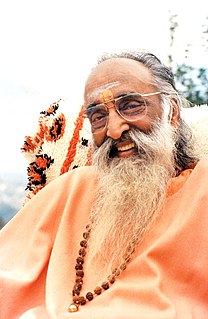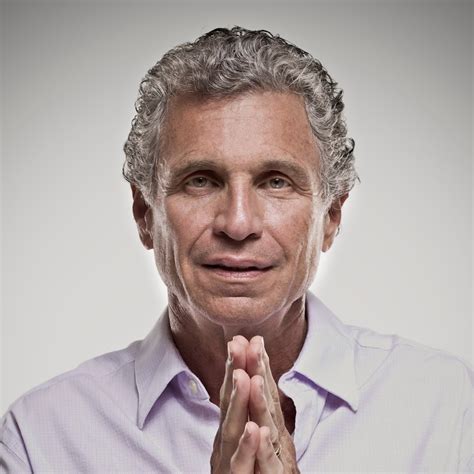A Quote by Swami Vivekananda
All action of Sattva, a modification of Prakriti characterised by light and happiness, is for the soul. When Sattva is free from egoism and illuminated with the pure intelligence of Purusha, it is called the self-centred one, because in that state it becomes independent of all relations.
Quote Topics
Related Quotes
Thus to act under the guidance coming from above, this is one side of the sadhana, the dynamic side. The other one is the discrimination between the Purusha and the Prakriti. The Purusha will calmly observe, give sanction, choose, but will realise that all this does not belong to him - all these are outside him. This is the static side of the sadhana. These two aspects constitute the basis of Yoga.
In Savasana or in meditation, the light of the eyes is drawn towards the lotus of the heart, so that the seat of the intelligence of the head is brought into contact with the seat of the intelligence of the heart, which is called the mind. Thus one passes from the individualistic state of consciousness to the universal state of consciousness. It is the merging of the intellect of the brain with the intellect of the soul.
Life is a system of relations rather than a positive and independent existence; and he who would be happy himself and make others happy must carefully preserve these relations. He cannot stand apart in surly and haughty egoism; let him learn that he is as much dependent on others as others are on him.
The concept (of happiness) is universal. In Buddhism, it is called causeless joy, in Christianity, the kingdom of heaven within, and in Judaism it is called ashrei, an inner sense of holiness and health. Is Islam it is called falah, happiness and well-being, and in Hinduism it is called ananda, or pure bliss.
Meditative state is the highest state of existence. So long as there is desire, no real happiness can come. It is only the contemplative, witness-like study of objects that brings to us real enjoyment and happiness. The animal has its happiness in the senses, the man in his intellect, and the god in spiritual contemplation. It is only to the soul that has attained to this contemplative state that the world really becomes beautiful. To him who desires nothing, and does not mix himself up with them, the manifold changes of nature are one panorama of beauty and sublimity.
The first act by virtue of which the State really constitutes itself the representative of the whole of societythe taking possession of the means of production in the name of societythis is, at the same time, its last independent act as a State. State interference in social relations becomes, in one domain after another, superfluous, and then dies out of itself; the government of persons is replaced by the administration of things, and by the conduct of processes of production. The State is not abolished. It dies out.
A lot of people say there is no happiness in this life, and certainly there's no permanent happiness. But self-sufficiency creates happiness. Happiness is a state of bliss. Just because you're satisfied one moment - saying yes, it's a good meal, makes me happy - well, that's not going to necessarily be true the next hour. Life has its ups and downs, and time has to be your partner. Time is your soul mate. Children are happy. But they haven't really experienced ups and downs yet. I'm not exactly sure what happiness even means. I don't know if I personally could define it.



































